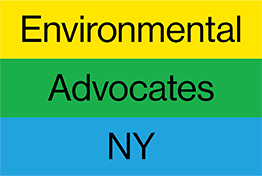NY Water Rangers Deliver 12,000+ Comments & Letters Detailing Fracking Concerns To Gov Cuomo & DEC
Near Close of Comment Period on State’s Fracking Proposals, Water Rangers Call on DEC, Gov Cuomo to Fix Flaws
ALBANY, NY (01/10/2012)—On the eve of the close of the public comment period on New York State’s fracking proposals, the Department of Environmental Conservation’s (DEC) revised draft Supplemental Generic Environmental Impact Statement (SGEIS), draft regulations, and draft stormwater permit, environmental groups hand-delivered more than 12,000 comments, nearly 500 letters, and a petition with more than 20,000 signatures from New Yorkers concerned about fracking to the agency and Governor Cuomo.
The 12,587 previously un-submitted comments and nearly 500 personal letters, from members of Citizens Campaign for the Environment (446 comments and 498 letters), Earthjustice (5103), Earthworks (858), Environmental Advocates NY (1,380), National Wildlife Federation (2,300), and Sierra Club-Atlantic Chapter (2,500), describe significant flaws in the state’s proposals to oversee industrial gas drilling using high volume horizontal drilling and hydraulic fracturing, or “fracking.” The comments delivered today are in addition to the 18,100 comments already received by the DEC, per Gannett News Service. The agency received approximately 13,000 comments on the first draft of the SGEIS in 2009, a record for the agency at the time.
“The comment period on New York’s flawed fracking proposals is almost over, but our fight to protect our waters and communities goes on,” said Katherine Nadeau, Water & Natural Resources Program Director, Environmental Advocates NY. “The Water Rangers call on Governor Cuomo and the Department of Environmental Conservation to address the concerns identified by New Yorkers from Buffalo to Watertown and Brooklyn before deciding when, where, how and if fracking takes place.”
“The proposal to hydro-frack New York has elicited unprecedented public participation that the Governor cannot ignore,” said Sarah Eckel, Legislative & Policy Director, CCE, “Among the letters being generated CCE has sent in over 20,000 signatures; and CCE’s members and supporters have written over 6,000 letters to the Governor and DEC during this comment period. The sustained and increased public participation demanding clean air, land, and water; and proof that Governor Cuomo and New York State are going to protect the people should show the Governor and DEC that there is no rush to drill and the public wants long-term meaningful protections.”
“Scientists, health professionals, and tens of thousands of New Yorkers have spoken. And they are rightly concerned about the state’s flawed plan to allow fracking in New York,” said Bridget Lee, an attorney with Earthjustice, a non-profit environmental law firm. More than 5,000 Earthjustice supporters submitted comments on the state’s plan. “The Governor should heed these concerns and order officials to revise the plan accordingly. He has a duty both to help the state withstand legal scrutiny, and, more importantly to protect the health of his constituents.”
“The failure to calculate the costs New Yorkers will pay for hydraulic fracturing is inexcusable. The costs to public health as cancer and immune disorder clusters spread, the costs of emergency response, the costs of loss of watershed, the costs of construction of frack waste disposal plants, air emissions clean–up, the value of the loss of historic tourism, agriculture, endangered and threatened species, fishing and hunting grounds are in fact staggering. The only reason hydraulic fracturing can be seriously considered is because the industry plans to drop these on the shoulders of New Yorkers. This cannot be tolerated,” said Nicole Dillingham, President Otsego 2000.
“New Yorkers keep telling Governor Cuomo and the DEC to do what it takes to safeguard air and water quality and public health from the impacts of dirty energy development; tens of thousands of comments should make them listen,” said Nadia Steinzor, Marcellus Regional Organizer for Earthworks. “Rather than fast-tracking regulations and ignoring critical issues in the SGEIS, they should seize this opportunity for New York to become a model of protection.”
According to Kate Hudson, Watershed Program Director, Riverkeeper, “DEC’s revised environmental review still fails to provide the facts and science necessary to show that fracking can be done safely and would be a net positive for the state’s economy and its upstate communities. DEC has admitted that its socioeconomic impact study is so flawed that it must be revised. There are good reasons to believe, based on the experiences of other states across the country, that fracking would do real and significant damage to New York’s environment, public health, community character, and even economy. Unless and until these concerns are fully addressed, fracking should not be allowed to move forward in New York.”
The Water Rangers, a partnership of environmental and community groups working to protect the state’s waters and communities from the dangers of industrial gas drilling and fracking, identified the “Top 10” Flaws in the state’s fracking proposals, including the state’s failure to analyze health impacts, assess the costs related to fracking, or undertake a cumulative impact analysis. The groups contend that without a hard, unbiased look at the health impacts of fracking, its cumulative impacts and costs to our communities, and a real plan for treating and disposing of the hundreds of millions of gallons of hazardous wastewater likely to result, the Governor and State Legislature cannot responsibly allow industrial gas drilling in New York.

